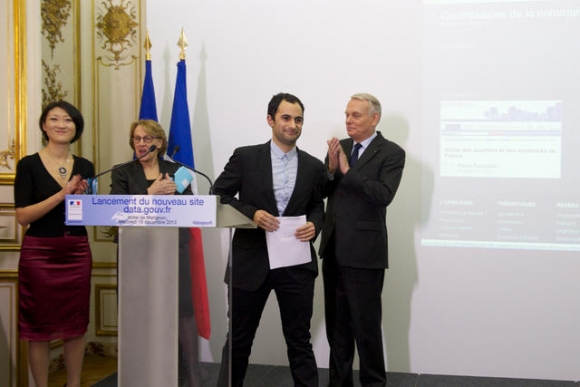This is a guest post from Rayna Stamboliyska and Pierre Chrzanowski of the Open Knowledge Foundation France
Etalab, the Prime Minister’s task force for Open Government Data, unveiled on December 18 the new version of the data.gouv.fr platform (1). OKF France salutes the work the Etalab team has accomplished, and welcomes the new features and the spirit of the new portal, rightly summed up in the website’s baseline, “share, improve and reuse public sector data”.
 OKF France was represented at the data.gouv.fr launch event by Samuel Goëta in the presence of Jean-Marc Ayrault, Prime Minister of France, Fleur Pellerin, Minister Delegate for Small and Medium Enterprises, Innovation, and the Digital Economy and Marylise Lebranchu, Minister of the Reform of the State. Photo credit: Yves Malenfer/Matignon
OKF France was represented at the data.gouv.fr launch event by Samuel Goëta in the presence of Jean-Marc Ayrault, Prime Minister of France, Fleur Pellerin, Minister Delegate for Small and Medium Enterprises, Innovation, and the Digital Economy and Marylise Lebranchu, Minister of the Reform of the State. Photo credit: Yves Malenfer/Matignon
Etalab has indeed chosen to offer a platform resolutely turned towards collaboration between data producers and re-users. The website now enables everyone not only to improve and enhance the data published by the government, but also to share their own data; to our knowledge, a world first for a governmental open data portal. In addition to “certified” data (i.e., released by departments and public authorities), data.gouv.fr also hosts data published by local authorities, delegated public services and NGOs. Last but not least, the platform also identifies and highlights other, pre-existing, Open Data portals such as nosdonnees.fr (2). A range of content publishing features, a wiki and the possibility of associating reuses such as visualizations should also allow for a better understanding of the available data and facilitate outreach efforts to the general public.
We at OKF France also welcome the technological choices Etalab made. The new data.gouv.fr is built around CKAN, the open source software whose development is coordinated by the Open Knowledge Foundation. All features developed by the Etalab team will be available for other CKAN-based portals (e.g., data.gov or data.gov.uk). In turn, Etalab may more easily master innovations implemented by others.
The new version of the platform clearly highlights the quality rather than quantity of datasets. This paradigm shift was expected by re-users. On one hand, datasets with local coverage have been pooled thus providing nation-wide coverage. On the other hand, the rating system values datasets with the widest geographical and temporal coverage as well as the highest granularity.

The platform will continue to evolve and we hope that other features will soon complete this new version, for example:
- the ability to browse data by facets (data producers, geographical coverage or license, etc.);
- a management system for “certified” (clearly labelled institutional producer) and “non-certified” (data modified, produced, added by citizens) versions of a dataset;
- a tool for previewing data, as natively proposed by CKAN;
- the ability to comment on the datasets;
- a tool that would allow to enquire about a dataset directly at the respective public administration.
Given this new version of data.gouv.fr, it is now up to the producers and re-users of public sector data to demonstrate the potential of Open Data. This potential can only be fully met with the release of fundamental public sector data as a founding principle for our society. Thus, we are still awaiting for the opening of business registers, detailed expenditures as well as non-personal data on prescriptions issued by healthcare providers.
Lastly, through the new data.gouv.fr, administrations are no longer solely responsible for the common good that is public sector data. Now this responsibility is shared with all stakeholders. It is thus up to all of us to demonstrate that this is the right choice.
(1) This new version of data.gouv.fr is the result of codesign efforts that the Open Knowledge Foundation France participated in.
(2) Nosdonnees.fr is co-managed by Regards Citoyens and OKF France.
Read Etalab’s press release online here
This post is by a guest poster. If you would like to write something for the Open Knowledge Foundation blog, please see the submissions page.








